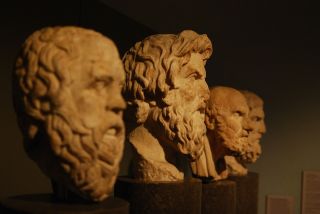Happiness
The Real Reason We Get Up in the Morning
Aristotle on life's ultimate purpose and meaning.
Updated June 20, 2024 Reviewed by Michelle Quirk
Key points
- Meaning is the strongest predictor of a long and happy life.
- Most people are confused about their ultimate purpose.
- Aristotle says the end purpose of everything that we do is happiness.

I sometimes ask my medical students, “What’s the strongest predictor of a long and happy life?” They invariably reply with exercise or diet, and these are of course very important. But the strongest predictor of a long and happy life is in fact a sense of meaning—which is why people deteriorate very quickly once they feel they have lost their purpose.
According to the London-based Institute of Economic Affairs, retirement increases the likelihood of developing depression by about 40 percent, and the likelihood of developing at least one physical condition by about 60 percent. While there may be other factors involved, such as inactivity, boredom, and loneliness, even these are tied to a lack of purpose—it being much harder to get bored or lonely, or even negatively stressed, if one has a clear direction of travel.
So, how to choose a purpose? How to find a meaning?
Enter Aristotle
In the Nicomachean Ethics (c. 330 BCE), Aristotle searches for the “supreme good for man”—that is, for the best way to lead our life and give it meaning.
For Aristotle, a thing is most readily understood by looking at its end, purpose, or goal (Greek, telos). For example, the purpose of a knife is to cut, and it is by seeing this that one best understands what a knife is; the goal of medicine is good health, and it is by seeing this that one best understands what medicine is, or, at least, ought to be.
If one persists with this, it soon becomes apparent that some goals are subordinate to other goals, which are themselves subordinate to yet other goals. For example, a medical student’s goal may be to qualify as a doctor, but this goal is subordinate to their goal to heal the sick, which is itself subordinate to their goal to make a living by doing something useful. This could go on and on, but unless the medical student has a goal that is an end-in-itself, nothing that they do is actually worth doing.
What, asks Aristotle, is this goal that is an end-in-itself? What, in other words, is the end purpose of everything that we do? The answer, says Aristotle, is happiness:
And of this nature happiness is mostly thought to be, for this we choose always for its own sake, and never with a view to anything further: whereas honour, pleasure, intellect, in fact every excellence we choose for their own sakes, it is true, but we choose them also with a view to happiness, conceiving that through their instrumentality we shall be happy: but no man chooses happiness with a view to them, nor in fact with a view to any other thing whatsoever.
Why did we get up and get dressed this morning? Why do we go to the dentist? Why do we go on a diet? Why am I writing this post? Why are you reading it? Because we want to be happy. Simple as that.
That the meaning of life is happiness (Greek, eudaimonia, "flourishing") may seem moot, but it is something that most of us have forgotten somewhere along the way.
Distinguishing Between Means and Ends
Oxford and Cambridge are infamous for their fiendish admission interviews, and one question that is sometimes asked is, “What is the meaning of life?” So, when I help prepare applicants for their interviews, I frequently put this question to them.
When they flounder, as they invariably do, I ask them, “Well, just tell me, why are you here? Why are you sitting here with me, prepping for your interviews, when you could be outside enjoying the sunshine?”
The students reply that they are sitting here with me because they want to do well in their interview … because they want to get into medical school … because they want to become a doctor.
“But why do you want to become a doctor?” I ask, playing devil's advocate. “Why on Earth would you want to put yourself through all that trouble?”
Among all the umming and ahing, the one thing that the students never tell me is the truth, which is, “I am sitting here, putting myself through all this trouble, because I want to be happy, and this is the best way I have found of becoming or remaining so.”
Somewhere along the way out of childhood, the students, even though they are only a tender 17, lost the woods for the trees. With the passing of the years, their short-sightedness will only get worse—unless, of course, they read and remember their Aristotle.
Neel Burton is author of The Gang of Three: Socrates, Plato, Aristotle.
References
Sahlgren, G (2013), Work Longer, Live Healthier: The relationship between economic activity, health and government policy. Institute of Economic Affairs, May 2013.
Aristotle, Nicomachean Ethics, Bk 1. Trans. Bartlett RC and Collins SD.




